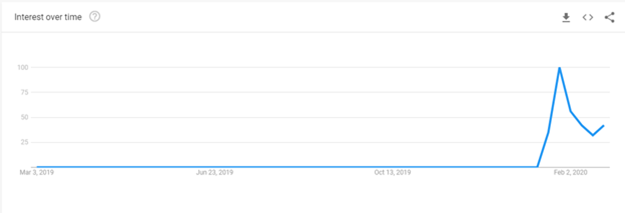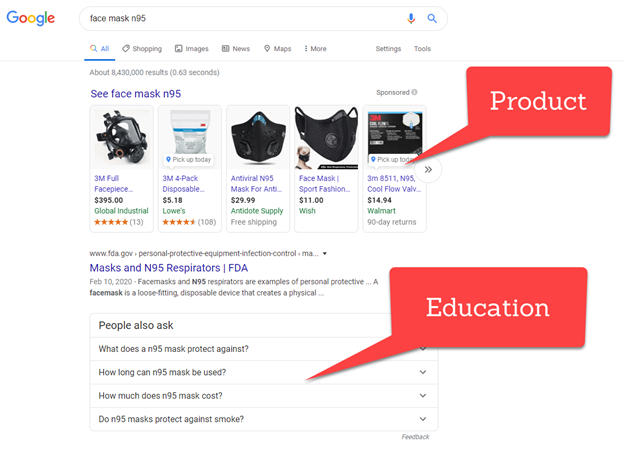This post was written by Wil Reynolds in collaboration with Mariel Mancini.
News trends pop up every day that change the shape of the SERP. Seer brings you the latest on what that trend looks like, how’s it affecting your business, and what you can do about it.
We scanned 5,567,172 million search terms in 3 minutes. With that data, we were able to take the rising searches and in real-time scan which clients show up for words like "corona" to determine a strategy.
- The old way would require an email out to the team, and each team would check client health and report back.
- With the new way, we query every client using BigQuery to protect them or develop new opportunities.
Did you know there’s a Corona, California? And a Corona, New York? If your company or your client has a facility or storefront in any of those places, the word "corona" could have a big impact! Keep reading for more insights from the data.
Global Health and Client Health Concern
Coronavirus has been spreading across the globe, with the largest outbreak in China. While the global health concern is a given, you may also want to be concerned about your digital marketing clients.
Where does digital marketing fit into all of this?
Google Trends shows the dramatic increasing search interest in "coronavirus" beginning in mid-January and reaching a peak at the beginning of February.
While searches began to decrease they will likely spike again in the coming days with increasing outbreaks in Italy and Iran.

Source: Google Trends Search Interest, past week
The area most affected by the virus is China. Questions we have to ask ourselves as digital marketers:
- Has this changed how people in affected countries are searching?
- Has this changed how the world is searching?
- How has this changed what the world needs in anyway?
Questions we have to dig into in our own data:
- Do we have markets in affected areas, has their behavior changed? (Ex: Check traffic from China)
- Based on the differences in the way folks are searching overall, does that affect our SERPs in anyway? Ex: is the "corona" beer brand showing ads for "coronavirus"...?
-
- Don’t think that happens? We showed up for Georgia keywords when we exact match targeted GA 360.
Mozcon folks remember that @SeerInteractive got matched to Georgia 360 when i exact match targeted GA 360, if you were in my preso, you know how to pull that data and check it to help keep Google from making you a 🤡 🤡. https://t.co/85kKfhGotI
— Wil Reynolds (@wilreynolds) August 1, 2019
-
- Increases in people doing virtual meetings could result in an opportunity. So think broader than “negate the word”, does your business offer a solution that could help fulfill new needs that come from this news trend? (Ex: Zoom added more video conferencing users this year than in all of 2019)
First Stop: Protect Your Budget
An initial scan across clients Seer found that 40% of our clients had shown up for a word including ‘corona’ in the last 12 months AND got 1 click. The client accounts that were affected the most being Healthcare. Given our tool, called Saving Ben, we were able to catch these terms early and negate them. We also identified 3% of clients showed up for "coronavirus" and 5% of clients showed up for "n95".
At Seer we bring every search term for every client into a data warehouse on a daily basis. We seek out news trends in order to protect client budgets by scanning across all clients for a word from that central data warehouse. Instead of hoping 30 people all check their clients in a certain time frame, we have one person mine the insights and distribute them out to the teams. This keeps teams focused on day to day strategy vs taking 10-20 minutes to check for 8-10 different keywords.
First steps for this news trend should be to negate “coronavirus” within all accounts and related terms such as “COVID-19” and even “face masks”.
Scanned clients at scale for "corona" to ensure they aren't exposed. Local PPC peeps there's a Corona, CA, check those. Google might be showing your ads, & people can't tell they are paid so they are clicking
Heres one method we use to speed up process: https://t.co/VNLLateGKS
— Wil Reynolds (@wilreynolds) February 26, 2020
Ecommerce Takes the Biggest Hit
In an effort to control and limit the spread of the virus China mandated factory shutdowns at the end of January. Many factories still remain closed at the time writing this post.
The ripple effects will mean inventory issues for many Ecommerce companies. Start communication with Ecommerce teams now.
They likely are already aware of what their inventory issues will look like. You may want to pull back on items that will be going out of stock and reinvesting on items that remain in stock.
The key is to continually check-in with your Ecommerce clients or Ecommerce teams about inventory status to prevent wasted ad spend.
Get Consultative
While some companies will see the lack of inventory as a hit to their business, others may be better poised to help solve problems.
Think: Surgical masks are selling out at a rapid pace, and the inventory left is being marked up astronomically.
Companies with similar products could remarket their items for coronavirus and potentially see an increase in volume while being able to help solve a major problem this news trend presents.
For one Seer client, who is in Ecommerce, we saw an increase in sales for a set of products they sell. This prompted us to have a conversation with them about taking a product people might want due to the virus and talk more on the landing page to connect with their experience vs pre-corona virus there was no need to address viruses.
As you can see, we can use Google’s learning of what people might be looking for to better understand what their concerns are. This helps us make the landing page better for customers.

Another potential opportunity is for clients who will not be having inventory issues and know that their competitors will.
Research on your client’s competitors can be conducted to know where their inventory is coming from, and if it will be affected. Bidding up during this time and gaining impression share could be a big win while competitors are pulling back due to inventory issues.
Find this helpful? Be sure to subscribe to our newsletter to get more content like this and stay informed on how Seer will continue to adapt to the effects of Coronavirus.



